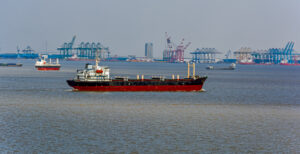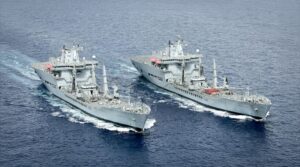Danish shipping giant A.P. Moller-Maersk (Maersk) has diverted two US-flagged ships from calling at Chinese ports as new port fees for US-linked ships came into effect on Tuesday, October 14. China has hit U.S.-owned vessels docking in the country with tit-for-tat port fees in response to the American government’s port fees on Chinese ships, expanding a string of retaliatory measures. The company described the changes as “temporary” without giving details about the reason of this decision.
Both containerships fly the American flag and operate on the Maersk’s TP7 route. A Maersk customer advisory said it was implementing temporary changes to the TP7 service, with immediate effect.
The two containerships will discharge cargoes in South Korea instead.
Shipping companies are adjusting their routes and ship deployments to minimize exposure to these fees. While some carriers have stated they do not expect to pass on costs to customers, the rerouting of ships can impact the global supply chain.
For the US-flagged Potomac Express/542E, built in 2008, Maersk said it will no longer call Ningbo. For cargo set to go to or via Ningbo, cargo will discharge at Busan and will be delivered to final destination by the existing Maersk network.
Ningbo exports to the United States will be loaded on the Maersk Luz and connect to the Potomac Express in Kwangyang on October 24 (subject to availability and capacity).
Similarly, the US-flagged containership Maersk Kinloss/543E, also built in 2008, will no longer call Ningbo. Import cargo intended for or via Ningbo will discharge at a South Korean port, and will continue to Ningbo and final destination via Maersk’s existing network. Exports from or via Ningbo to the United States will be loaded on a shuttle, name to be provided, and tranship in South Korea.
For the near future Maersk said, “We will be making changes to the TP7 rotation to make sure your supply chains continue to run as smoothly as possible, if you are utilising this service.
“We will ensure to inform you of further changes, temporary or long-term, to this service, with as much notice as possible. If further changes occur to regional or global network, we will also inform you of changes.”
China started collecting special port fees from U.S.-owned, operated, built, or flagged vessels on Tuesday, but said Chinese-built ships would be exempted from the levies.
China’s ministry of transportation said ships built in China are exempt from payment. In a last minute notice, the ministry announced on Tuesday that Chinese-built vessels are exempted from the port fees, even if they are owned or operated by US-linked companies or if they are flying the American flag.
The details published by the ministry of transport clarify the specific provisions on exemptions, including for ships built by China and empty ships entering Chinese shipyards for repair. The announcement also refers to other vessels that are deemed exempted from payment, though no further details were provided.
While carriers are rerouting to avoid extra costs and comply with regulations, shipping analysts warned last week that the port fees could still impact the supply chains.



